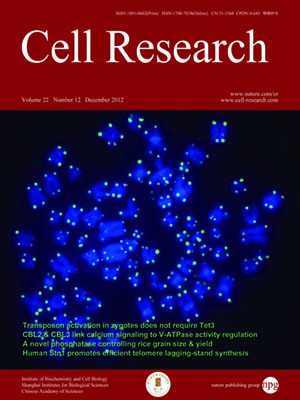Volume 22 Issue 12, December 2012: 1696-1706
ORIGINAL ARTICLES
Activated mouse CD4+Foxp3- T cells facilitate melanoma metastasis via Qa-1-dependent suppression of NK-cell cytotoxicity
Xiaojuan Wang1,2,*, Yanyan Cui1,*, Gaoxing Luo1,*, Qinghong Wang1,*, Jie Hu1, Weifeng He1, Jun Yuan1, Junyi Zhou1, Yan Wu3, Xiaofeng Sun3, S
1Institute of Burn Research, State Key Laboratory of Trauma, Burns and Combined Injuries, Southwest Hospital, Chongqing Key Laboratory for Disease Proteomics, Third Military Medical University, Chongqing 400038, China
2Department of Burn and Plastic Surgery, Chengdu Military General Hospital, Chengdu, Sichuan 610083, China
3Transplant Research Institute, Beth Israel Medical Center, Harvard Medical School, Boston, MA 02215, USA
4Institute of Immunology, Zhejiang University School of Medicine, Hangzhou, Zhejiang 310058, China
5Antagen Institute for Biomedical Research, Boston, MA 02118, USA
Correspondence: Jun Wu, Wenda Gao,(junwupro1@yahoo.com.cn; wendagao01@gmail.com)
The regulatory activities of mouse CD4
+Foxp3
+ T cells on various immune cells, including NK cells, have been well documented. Under some conditions, conventional CD4
+Foxp3
− T cells in the periphery are able to acquire inhibitory function on other T cells, but their roles in controlling innate immune cells are poorly defined. As a potential cellular therapy for cancer,
ex vivo activated CD4
+Foxp3
− effector T cells are often infused back
in vivo to suppress tumor growth and metastasis. Whether such activated T cells could affect NK-cell control of tumorigenesis is unclear. In the present study, we found that mitogen-activated CD4
+Foxp3
− T cells exhibited potent suppressor function on NK-cell proliferation and cytotoxicity
in vitro, and notably facilitated B16 melanoma metastasis
in vivo. Suppression of NK cells by activated CD4
+Foxp3
− T cells is cell-cell contact dependent and is mediated by Qa-1:NKG2A interaction, as administration of antibodies blocking either Qa-1 or NKG2A could completely reverse this suppression, and significantly inhibited otherwise facilitated melanoma metastasis. Moreover, activated CD4
+Foxp3
− cells from Qa-1 knockout mice completely lost the suppressor activity on NK cells, and failed to facilitate melanoma metastasis when transferred
in vivo. Taken together, our findings indicate that innate anti-tumor response is counter regulated by the activation of adaptive immunity, a phenomenon we term as “activation-induced inhibition”. Thus, the regulatory role of activated CD4
+Foxp3
− T cells in NK-cell activity must be taken into consideration in the future design of cancer therapies.
Cell Research (2012) 22:1696-1706. doi:10.1038/cr.2012.128; published online 4 September 2012
FULL TEXT | PDF
Browse 2794


